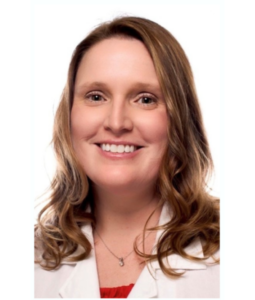 When he was just five years old, Board Certified PA Kendra Clark’s brother, Guy, ran into the street while flying a kite and was hit by a truck. He suffered traumatic brain injury, remaining at the cognitive level of a five-year-old for the next 53 years. This life-changing experience led Clark to work with individuals with special needs, including volunteering with organizations such as the Special Olympics. As a caregiver for her brother, she strengthened her passion to serve those in need.
When he was just five years old, Board Certified PA Kendra Clark’s brother, Guy, ran into the street while flying a kite and was hit by a truck. He suffered traumatic brain injury, remaining at the cognitive level of a five-year-old for the next 53 years. This life-changing experience led Clark to work with individuals with special needs, including volunteering with organizations such as the Special Olympics. As a caregiver for her brother, she strengthened her passion to serve those in need.
Clark, who specializes in neurosurgery and aesthetics and the study of longevity and well-being, strongly believes quality care for individuals with disabilities starts with educating the health care professionals who serve them. “In a perfect world, I desire for every medical provider to have a healthy and respectful comfort level when asked to serve patients with disabilities,” said Clark. “This comfort level can only be reached by further educating health care professionals on the primary fundamentals of respectful engagement.”
Exposure to the disabled community is also important. “I believe the discomfort that comes with serving patients with disabilities is sometimes caused by a lack of experience with the disabled community,” Clark said. “Health care providers can improve quality of care for individuals with disabilities by seeking volunteer experiences such as with disability service organizations.”
From her professional and personal experience, Clark says preparation is key to providing quality care to patients with disabilities. She recommends preparing for patient visits by reviewing their medical history, allowing additional time for visits, and considering their vulnerabilities. “Patients with disabilities are more likely to have secondary complications that progress quickly to major issues, and may also be at increased risk of sexual, verbal or physical abuse,” said Clark.
Clark is not alone in emphasizing education for health care providers.
 Heather Brown, DMSc, PA-C, DFAAPA, a faculty member at the Brenau University PA program in Gainesville, Georgia and an urgent care provider in Atlanta, is an advocate for members of the deaf community. Her work focuses on removing communication barriers, especially for patients who are deaf and hard of hearing. She teaches interpreters and other language professionals who work in health care settings how to improve experiences for deaf patients.
Heather Brown, DMSc, PA-C, DFAAPA, a faculty member at the Brenau University PA program in Gainesville, Georgia and an urgent care provider in Atlanta, is an advocate for members of the deaf community. Her work focuses on removing communication barriers, especially for patients who are deaf and hard of hearing. She teaches interpreters and other language professionals who work in health care settings how to improve experiences for deaf patients.
“I have been inspired to be an ally and an advocate in health care for members of the deaf community through my experience with deaf individuals as friends and patients,” said Brown. “Hearing loss is a great example of a non-visible disability and taking the first step of being aware and seeking opportunities to learn more can assist us greatly in providing superior care to our patients.”
Brown focused the thesis of her Doctorate on the inequalities faced by the deaf on their healthcare journeys. “As PAs, we are trained to be excellent communicators, but we fail our deaf patients if we can’t identify issues and enact proactive strategies to improve our practice,” she said. Brown believes a little bit of knowledge about disabilities like deafness can improve quality of care and continues to seek and take on opportunities to teach members of the interpreter and medical communities about improving care for deaf individuals.
When thinking about disability care in the next five to ten years, Brown envisions a profession where patients with disabilities are approached with forethought: “Rather than dealing with a patient with a different need in the moment, what if we could see them ahead of time and anticipate how to best meet their needs?” Clark encourages medical institutions to include trainings and volunteer experiences in their curriculum to prepare health care providers. “Patients with disabilities give us one of the greatest opportunities for professional growth if we are willing to learn.”

